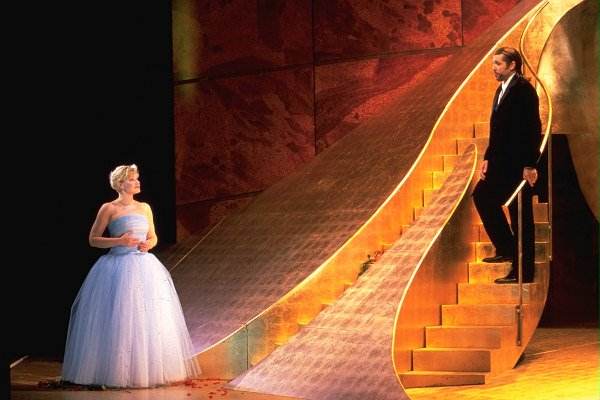S & H International Opera Review
Strauss, Arabella, Théâtre du Châtelet, Paris, April 13, 2002 (FC)
The assembled cast for this performance is a milestone in the growing importance of the operas of Richard Strauss in the world repertory system. In the post war decades, there were usually only three Strauss operas to be found on world stages. Only Rosenkavalier, and a bit less often Salome or Elektra, would regularly be found in a season's program. Now Strauss is as much a part of any season's opera repertory as Verdi or Puccini and audiences can regularly hear Die Frau ohne Schatten and Arabella. There are even some opportunities to see the more rarely performed operas like Die schweigstame Frau, Capriccio and Die Liebe der Danae.
Arabella, Strauss' final collaboration with Hugo von Hofmannsthal, has a recent history of being the vehicle for a (usually ageing) diva to take her star turn singing one of Strauss' most delicious roles for the soprano voice. The two other major roles in the opera were not usually given to singers of the first rank. This is certainly not the case for the performances this month at the Théâtre du Châtelet in Paris and this is why the level of excitement is at fever pitch. Perhaps Arabella is now considered to be at the level of Aïda or Tosca where all the major roles merit "star" casting.
Sharing the spotlight with the soprano super-star Karita Matilla in the title role is the equally acclaimed baritone Thomas Hampson. Playing Arabella's sister is the pretty and talented cover girl of this month's Gramophone magazine, Barbara Bonney. This collection of voices of supreme international fame while they are still in their youthful prime (Matilla and Hampson are both doing the roles for the first time) is rare on any stage in any city. Add to the mix the conducting of renowned Strauss interpreter Christoph von Dohnányi and the honoured stage director Peter Mussbach, and it has all the ingredients of a performance that will be talked about for years to come.
Unavailable for the opening night performance due to a cold, Mattila sang the second performance with a handkerchief tucked in her sleeve for occasional discrete nose blows and dabbing. There was no indication that her voice was in any way impaired however and she sang with a warmth, power and easy grace. Her glorious projection and detailed portrayal puts her clearly at the top rank of great Straussian interpreters and one waits with impatience her future Strauss heroines. Mossback took advantage of her youth and interpretative skills and Mattila's Arabella was a young girl trembling on the brink of adult commitments and duties. Her love scenes have vitality, sensuality and a passion one never gets to experience in this role.
Thomas Hampson, one of the reigning baritones today, is known for his warm, round-toned and acting skill. It is a revelation to see this role being done by such a splendid talent and confirms his belief that Mandryka is one of the great baritone roles in the opera repertory. His Act II aria is a multi-layered plea for an end to his loneliness and is delivered with extraordinary richness and power. The two duets, sung with such over-arching beauty by the lovers, are certainly a highlight of this production.
Peter Mussbach and his set designer Erich Wonder and costume designer Andrea Schmidt-Futterer created a production that takes place entirely in the lobby of an ultra-modern hotel. Clean lines and a sweeping, curvilinear staircase dominate the lobby (likely influenced by the hotel work of top designer Philippe Starck). I was not greatly troubled by placing all the action in a single set and Mussbach made innovative use of the multi-level space. Costumes were colourful, handsome and filled with skinny, terribly fashionable young people in the Ball scene and they made as much contrast as possible with the somber Biedermeier fashion that one usually finds used in this opera. The three suitors that lost Arabella to Mandryka were appropriately foppish in their velvet coats and long hair.
The Matteo in this production, Hugh Smith, sang more freely in the second performance than at opening night and also was reported to be recovering from a cold. He seems to be forcing his strong tenor a bit too much in this role, however. Anyone who has seen Donald Gramm's masterful performance as the father of the bride, Count Waldner, could not be entirely pleased with the same by baritone Günter Missenhardt but others might find it well-realised and spirited. Olga Trifonova, with orange hair in the coloratura role of Milli, sounded less shrill on the second night of the run and Cornelia Kallisch's strong voice impressed as the mother, Adelaide.
The Philharmonia Orchestra from London was in the pit under the baton of Christoph von Dohnányi. He conducted Natalie Dessay in the Strauss opera Die schweigestame Frau and it was one of the high water marks of the last season at Châtelet. His lean but muscular conducting splendidly illuminated many telling details in this remarkable work. This opera will be recorded for broadcast by France Musiques on June 1 and, as it is a co-production with the Royal Opera, will be seen at Covent Garden in the upcoming season. It is also being recorded during these dates in Paris for eventual release on DVD and Compact Disc.
Frank Cadenhead
Karita Mattila in the title role and Thomas Hampson as Mandryka.

 Return to:
Return to: